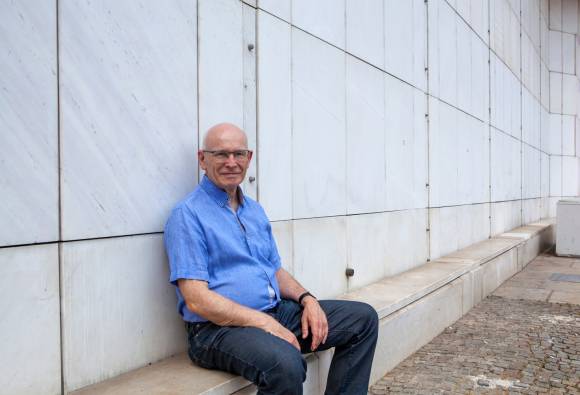
ALIENATION/S
International Philosophy Conference
Ljubljana, Cankarjev dom, 26–28 September 2023
Between 26 and 28 September 2023 Aufhebung – International Hegelian Association, Cankarjev dom, Goethe-Institut Ljubljana and the Faculty of Arts of the University of Ljubljana are organising an international philosophy conference on modern-day power structures at Cankarjev dom Ljubljana. The speakers include renowned international and Slovenian philosophers, most notably Mladen Dolar, Rey Chow, Helen Rollins, Gregor Moder, Laurent de Sutter, Nathan Brown, Bara Kolenc, Aleksandar Matković, Martin Hergouth, Nadežda Čačinovič, Ross Wilson, Niklas Toivakainen, Magdalena Germek and Goran Vranešević.
The conference is dedicated to the topic of alienation.
On the most general level, the concept of alienation suggests that we are alienated from our world, from nature, from other people, from sociality, from our work, from our products that confront us as alien objects, and ultimately, from ourselves. The concept implies a call to overcome this devastating state, to heal this wound and bridge this chasm. It therefore calls for disalienation, relying on an implicit sequence, on a minimum scenario in which the original unalienated state is followed by a fall into alienation, which is to be eventually eliminated by the perspective of its transcendence. The term has its pre-Marxist history, which is perhaps most pronounced in Rousseau's conception of civilization as a process of alienation from the supposed natural state, and in Hegel (Entfremdung, Entäusserung). The term, however, became widely applicable and sparked broad discussion, largely based on its use in Marx's early manuscripts. The conference’s position on the concept of alienation is that it is possible to follow the productive use of this term and formulate a mechanism of alienation that would strengthen and offer a new support to emancipation rather than opposing it. Is it possible to frame a policy of alienation that would not merely postulate its elimination?
Scientific Committee: Mladen Dolar, Bara Kolenc, Gregor Moder, Urban Šrimpf, Barbara Rogelj
The international philosophy conference will be held in English, summaries of the lectures will be available in Slovenian.
|
TUESDAY |
WEDNESDAY |
THURSDAY |
||||
|
26. 9. |
27.9. |
28.9. |
||||
|
11:00 do 13:00 |
OPENING |
Bara Kolenc |
Ross Wilson |
|||
|
Rey Chow |
Nathan Brown |
Niklas Toivakainen |
||||
|
Chair: Mladen Dolar |
Chair: Alfie Bown |
Chair: Peter Klepec |
||||
|
17:00 do 19:00 |
Helen Rollins |
Aleksandar Matković |
Magdalena Germek |
|||
|
Gregor Moder |
Martin Hergouth |
Goran Vranešević |
||||
|
Chair: Peter Klepec |
Chair: Goran Vranešević |
Chair: Martin Hergouth |
||||
|
19:30 do 21:00 |
Laurent de Sutter |
Nadežda Čačinovič |
Mladen Dolar / Conversation |
|||
|
Chair: Gregor Moder |
Chair: Bara Kolenc |
Chair: Alfie Brown |
Alienation is a negative term referring to a situation that needs to be eliminated. On the most general level, the concept suggests that we are alienated from our world, from nature, from other people, from sociality, from our work, from our products that face us as alien objects, and ultimately, from ourselves. The concept implies a call to overcome this devastating state, to heal this wound and bridge this chasm. It therefore calls for disalienation, relying on an implicit sequence, on a minimum scenario in which the original unalienated state is followed by a fall into alienation, which is to be eventually eliminated by the perspective of its transcendence.
The term has its pre-Marxist history, which is perhaps most pronounced in Rousseau's conception of civilization as a process of alienation from the supposed natural state, and in Hegel (Enfremdung, Entäusserung). The term, however, became widely applicable and sparked broad discussion, largely based on its use in Marx's early manuscripts. If we limit ourselves to just one quote (we could easily offer many more):
Estrangement is manifested not only in the fact that my means of life belong to someone else, that my desire is the inaccessible possession of another, but also in the fact that everything is in itself something different from itself — that my activity is something else and that, finally – and this applies also to the capitalist – all is under the sway of inhuman power.
If in an alienated world all things are something other than themselves, then this leads to the requirement that their true identity be restored, so that they become "themselves" (again), and above all – because we ourselves are the other of ourselves – that we return to ourselves and free ourselves from the chasm. The sway of inhumanity should be abolished by means of reintegrating all inhumanity into human powers insofar as inhumanity has always been solely a historical product of their alienation, of the fact that humanity has become alien to itself throughout a long historical era, an era that culminated in capitalism and should now be historically transcended. Thus, the concept of alienation is also closely linked to humanism and to the call for all inhumanity to be reduced to human measure and that alienated powers be returned to their maker.
Most of the tradition of Western Marxism roughly followed this starting point, from Lukacs and the Frankfurt School (in our context, most explicitly through Praxis) to modern efforts, with a range of variations and modalities. Within this context, different conceptions have formed, for example, on the one hand with Adorno's thesis of "the priority of the object" as an indicator of authentic human experience, or on the other hand with Althusser's harsh critique of humanism and the very idea of alienation. Was alienation merely an attempt at a concept by the young Marx, which he later abandoned (did he really?), and therefore something that should be rejected? Can this term be used in a context other than its habitual humanistic one? What is the relationship between alienation and class struggle as a fundamental social antagonism? Is alienation a productive way of facing this, or does it rather blur the real issue?
If taking psychoanalysis as the second connecting link, it becomes clear that this aspect entails a very different understanding of alienation. Its starting point is Freud's discovery of the unconscious, that is, precisely the alien nucleus within ourselves, which testifies to the fact that we are not masters in our own house. However, a fundamental ambiguity surrounds this alien nucleus: is the unconscious merely an effect of a repressive society, so that the elimination of repression would ultimately lead to the possibility of shaking off this foreign body within ourselves? If not shaking off entirely, perhaps at least diminishing and taming it?
Are we destined to be alien to ourselves forever, with psychoanalysis teaching us how to deal with it? Will we never be masters in our own house? Ambiguity ultimately suggests that this alien nucleus is not something that we can get rid of or something we can integrate in order to achieve our true self, but that it is precisely in this foreign body that the difficult truth should be sought, the truth that we must preserve and acknowledge, follow its delusional and precarious paths, deal with our chasm and our wound.
At some point in his teachings Jacques Lacan introduced the concept of alienation as a term referring to a subject's entry into symbolic order and thus synonymous with entering into language. The mechanism of alienation shows how the very entry into the symbolic constitutes the emergence of the unconscious. In this regard, alienation coincides with the constitution of the subject and is its "condition of possibility", so that the subject (as opposed to the ego) ultimately surfaces as the subject of the unconscious. On the other hand, as an anchorage of the self and personality, the ego, in its constitution, also relies on alienation, but a different one, namely, the "mirror stage", in which the formation of the ego ultimately depends on self-recognition in a mirror image. Alienation is therefore constitutive and ineliminable, as this would involve the loss of the subject itself – but then what is the purpose of psychoanalytic practice in relation to alienation? If alienation is an indispensable condition, how then to formulate an emancipatory perspective opened up by psychoanalysis?
In addition to the legacy of Marxism and psychoanalysis, are there other modern currents of thought that can productively use the concept of alienation? Has this term already been surpassed, or can a productive core still be found in it? Can the concept of alienation be effectively used to articulate issues engendered by new technologies, artificial intelligence and the like?
The conference’s position on the concept of alienation is that it is possible to follow a productive use of this term and formulate a mechanism of alienation that would strengthen and offer a new support to emancipation rather than opposing it. Is it possible to frame a policy of alienation that would not merely presuppose its elimination? Contrary to established use, could a hymn to alienation be conceived?
Prof. Dr. Mladen Dolar
Organizers: Goethe-Institut Ljubljana, Aufhebung – International Hegelian Association, Cankarjev dom Ljubljana and the Faculty of Arts, University of Ljubljana (YUPHIL research project).


Bodite med prvimi ...
.... ki boste izvedeli, katere koncerte, predavanja, gledališka in plesna gostovanja in drugo pripravljamo v Cankarjevem domu,


